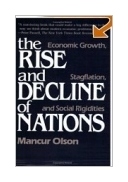|

RISE AND DECLINE OF NATIONS
OLSON M. wydawnictwo: YALE , rok wydania 1982, wydanie I cena netto: 82.00 Twoja cena 77,90 zł + 5% vat - dodaj do koszyka Reviews
Mancur Olson is one of the intellectual giants of our time. His Nobel Prize was awarded
for ground breaking work which he presented in his prior major work, "The Logic of
Collective Action." This work, as with any economic theorizing that must be taken
seriously by the establishment, is formal and quantitative, as are his many published
papers in the peer reviewed press.
In the "Rise and Decline of Nations" Mancur Olson revealed the teacher in
himself with a lucid readable account that left the mathematics in the footnotes. It was
one of those books that Samuel Britten would give to his bright nephew who wants to know
what it is all about without doing the difficult math.
His thesis can be simply expressed as follows: societies that are governed by an
encompassing interest will function better than societies that are governed by exclusive
interests, whether these be tyrants, kings, oligarchs or representative democratic
institutions corrupted by narrow interests. It is the inexorable development of the
influence of powerful but minority groups that threatens to bring down the efficiency of
governments in countries that have been stable for a long time. There is much to say for
this interpretation of the evidence. But Olson says more than this. Why, he asks, does
this occur?
Why does a successful and vital democratic system become hollowed out from inside? Olson
points to the tragedy of the commons. Reviewers on Amazon seem to have missed this central
point. Olson shows with rigorous logic why this occurs, and why it is inevitable. An
average voter generally feels that his voice is tiny in the sea of a wider electorate. He
instinctively knows that a large personal investment in becoming aware of the details of
the political and economic life of his country yields a poor individual return, and so he
lets someone else do it, or trusts that the politicians will not mess it up too badly.
This is a limitation on the ability of the mass to govern itself in addition to the
inability of that segment of the electorate that do not have enough schooling to grasp the
salient issues. Unless someone is a political pundit, paid for expressing informed
political opinion, he will go with the flow or vote according to superficial impressions
and imperfect heuristics.
On the other hand, the logic is quite different when the individuals are lobbying for a
minority interest that may return direct minority benefits. The commons is smaller. The
Coaseian bargain easier to put together. There is a structural bias for those who wish to
corrupt the system in the favour of narrow interests to want to invest more effort to do
so. That bias easily outweighs any inclination for average citizens to prevent it from
happening. And so, in the long term, the governments of stable nations become
progressively more corrupt and less representative.
Mancur Olson did not live to see how vividly his theory would be confirmed under the
presidency of Bush, junior. It is we who can see this as one more piece of empirical
evidence that Olson's theory is correct.
Olson's theory predicts that this will get worse, not better. On the other hand, it is
also Olson's prediction that when a very serious crisis takes place, many of the
corrupting forces clustered about the centre of power can be flushed away. It is precisely
this process in the form of Mao's Cultural Revolution that wiped out the middle cadre of
the Communist Party in China, that paved the way for the Chinese miracle taking place
today.
We might ask, if we follow Olson's logic, whether the coming economic crash that the
current Republican administration of the USA is engineering will be severe enough to bring
about a thorough going clean out and an American revival? (And let's face it; Bush's
economic policies are incompetent to the point of ruinous. His military and political ones
too.) Or will the USA continue throughout the coming 50 years to sink inexorably into a
quagmire of economic and political rigidities, to become a has-been nation as the UK did
in the last century? Olson seems to predict the latter.
Paperback
276 pages
Po otrzymaniu zamówienia poinformujemy,
czy wybrany tytuł polskojęzyczny lub
anglojęzyczny jest aktualnie na półce księgarni.
|


